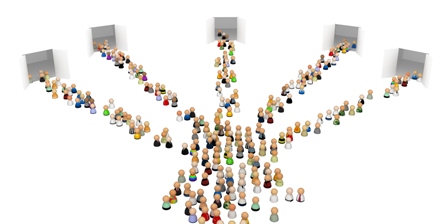The views expressed in our content reflect individual perspectives and do not represent the authoritative views of the Baha'i Faith.
 Baha’is devote themselves to the principle of unity — whether expressed in terms of race, gender, nationality, or religion. We actively seek out people from every social background hoping to get to know them, to learn something new about our complex world and its many traditions, and to spread a spirit of love and acceptance among the peoples of the world. This constant work for unity is not simply a manifestation of good will. Instead, it comes directly from the central teaching of the Baha’i Faith, one every major figure and institution in the Faith encourages.
Baha’is devote themselves to the principle of unity — whether expressed in terms of race, gender, nationality, or religion. We actively seek out people from every social background hoping to get to know them, to learn something new about our complex world and its many traditions, and to spread a spirit of love and acceptance among the peoples of the world. This constant work for unity is not simply a manifestation of good will. Instead, it comes directly from the central teaching of the Baha’i Faith, one every major figure and institution in the Faith encourages.
The concept of religious unity is a particularly important aspect of the Baha’i world-view. Let’s consider some common elements to the world’s great religions:
- A number of major religions have initiated new civilizations that have profoundly impacted the religious life of the world. These include Judaism, Christianity, Hinduism, Buddhism, and Islam.
- One central prophetic Figure, renowned for purity of spirit and the recipient of an extraordinary spiritual experience, founded each of these religions. Moses, for example, confronted the burning bush, Buddha came to enlightenment under the Bodhi tree, the Holy Spirit appeared to Jesus in the form of a dove during his baptism, and the Maid of Heaven inspired Baha’u’llah, Prophet-Founder of the Baha’i Faith, a prisoner of conscience in a terrible dungeon in Persia.
- Many of these prophetic Figures were persecuted by the religious leaders of previous dispensations.
- All of these religions teach the same spiritual virtues such as love, justice, honesty, selflessness, wisdom, humility, forgiveness, compassion, and charity.
- All of these traditions have laws and ordinances, though these are specific to the time and people for whom the religion was revealed. Abdu’l-Baha explains why it is that the various religions, though sharing a common spiritual foundation, have contradictory social regulations:
[S]ocial laws and regulations [are] applicable to human conduct. This is not the essential spiritual quality of religion. It is subject to change and transformation according to the exigencies and requirements of time and place.… The essential ordinances established by a Manifestation of God are spiritual; they concern moralities, the ethical development of man and faith in God. They are… immutable, unchanging throughout the centuries…. (The Promulgation of Universal Peace, pp. 365-366)
- All of the major world religions have prophecies about future dispensations, avatars, or messiahs. In the Bhagavad Gita, Krishna tells Arjuna that He manifests Himself from age to age whenever a decline in morality occurs. Similarly, Buddha taught that he was neither the first nor the last Buddha, and instructed his followers that a supreme avatar would eventually come to revive religious life. Moses promised a future Messiah, Jesus promised His own return under a new name, and Muhammad prophesized two trumpet blasts that would raise the dead. Of course, Baha’is believe that Baha’u’llah fulfills all of these prophecies.
But the Baha’i Writings go further than arguing that these religions are similar or simply continuous with each other. Baha’is believe that the Founders of these religions share one Spirit. Here’s how Baha’u’llah describes the relationship:
These Manifestations of God have each a twofold station…. [They] are . . . all sent down from the heaven of the Will of God, and . . . are regarded as one soul and the same person…. The other station is the station of distinction…. In this respect, each Manifestation of God … is known by a different name, is characterized by a special attribute, fulfils a definite mission, and is entrusted with a particular Revelation. (Gleanings from the Writings of Baha’u’llah, pp. 50-53)
So Baha’is don’t believe that the religions simply agree; we believe that they are actually all one faith, the
“changeless faith of God, eternal in the past, eternal in the future” (Proclamation of Baha’’u’llah, p. 119).
 Baha’is call this conceptualization of the essential oneness of religion “progressive revelation,” which means that God has provided Teachings suitable for each stage of human spiritual evolution. We believe that the Teachings of Baha’u’llah have been specifically revealed for this age, providing the most recent update of God’s Will for humanity.
Baha’is call this conceptualization of the essential oneness of religion “progressive revelation,” which means that God has provided Teachings suitable for each stage of human spiritual evolution. We believe that the Teachings of Baha’u’llah have been specifically revealed for this age, providing the most recent update of God’s Will for humanity.
Accepting the fundamental unity of all religions, however, can easily become intellectual and academic unless we find a way to put this insight into action. Since, as Baha’u’llah tells us, the purpose of religion is the appearance of love and unity, we need to find strategies for promoting religious unity in our daily lives. This is a new mission for most of us. Not many people wake up each morning and ask themselves, “What can I do to promote religious unity today?”
Baha’is believe that the time has arrived for all people of faith to reflect deeply on religious unity and to practice this principle in our daily lives.
















Comments
Sign in or create an account
Continue with Googleor